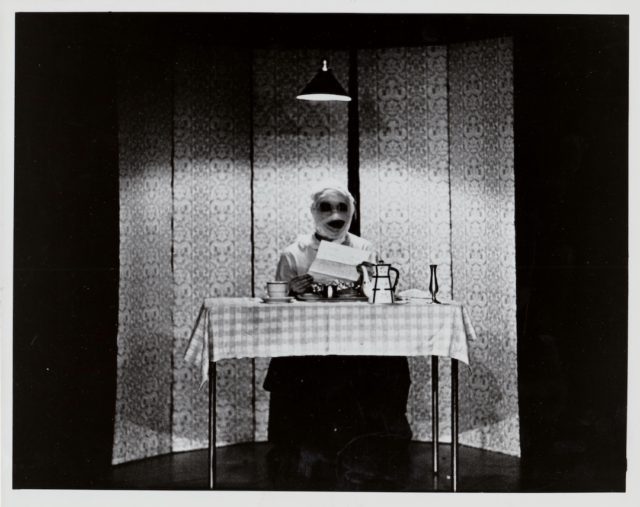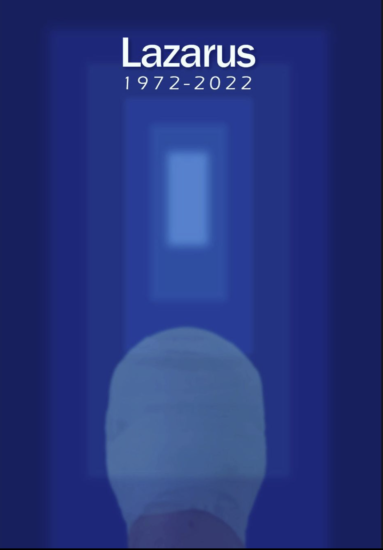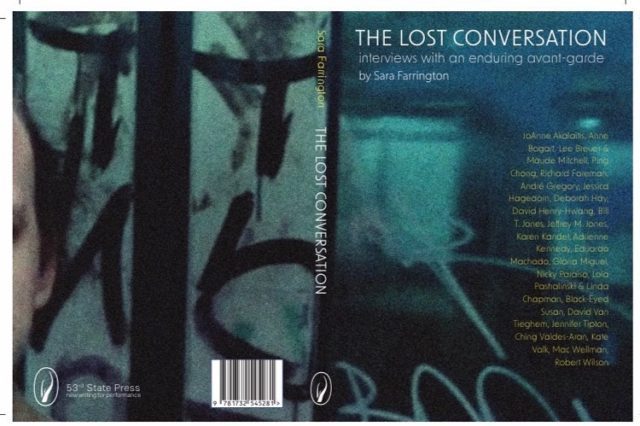
Ping Chong will revisit his 1972 work, Lazarus, at La MaMa (photo by Cathy Zimmerman)
Who: Ping Chong and Company
What: Reimagining of Ping Chong’s 1972 Lazarus
Where: La MaMa Downstairs Theater, 66 East Fourth St. between Second & Third Aves.
When: September 30 – October 16, $30 (panel discussion moderated by Sara Farrington on October 9 after 4:00 show)
Why: “I’ve never thought of myself as a theater artist, I’ve thought of myself as an artist in the theater,” Ping Chong tells Sara Farrington in her new book, The Lost Conversation: Interviews with an Enduring Avant-Garde (53rd State Press, April 2022, $16). Asked how he first became involved in avant-garde theater around 1971, the Toronto-born Ping explains, “I graduated from the School of Visual Arts in film and I didn’t know what I was going to do. I mean, there were no filmmakers of color around. There was no role model and I wasn’t one of these go-getter aggressive kids. So I was just killing time, trying to figure out what to do next. And then a friend of a friend, an associate of mine from school, said, I’m taking some dance classes with Meredith Monk, do you want to go? So I took her classes — she was doing continuing education classes at NYU. And Meredith said to me, You’re talented, come to my workshop. But I didn’t.” He eventually did attend a workshop — Monk’s studio was only three blocks from his apartment — and even joined Monk’s company. His apartment was also only two blocks from La MaMa; he put on his first show there in 1979.

Ping is now back at La MaMa with what will be his final production as artistic director, Lazarus 1972–2022, a reimagining of his first independent work, which was staged at Meredith Monk’s loft studio half a century ago. It’s a nonlinear piece about cultural alienation in which the title biblical character is resurrected in 1972 New York City; it featured projections, puppets, voice-overs (by Ping and Andrea Goodman), sound effects, music, but no dialogue spoken by the two main characters, portrayed by Tony Jannetti and Catherine Zimmerman. The sixty-minute Lazarus 1972–2022 runs Thursdays through Sundays from September 30 to October 16 at La MaMa Downstairs Theater; Christopher Caines will be Lazarus and Jeannie Hutchins portrays Woman, with sets by Watoko Ueno, lighting by Hao Bai, costumes by Stefani Mar, sound by Ernesto Valenzuela, and projections by Kate Freer.
“Lazarus was a metaphor for my own experience, because I had just left my insular world of Chinatown, moving out of that limbo into figuring out how to exist in larger society,” Ping said in a statement. “The original show was 1972; New York City was nearly bankrupt at that time and the urban purgatory aspect of it was very surreal and real. Originally the work reflected that — but the work has changed: I’m a lifetime New Yorker, and Lazarus is now different than the show was at the time in the sense that New York is also different, and centrally, part of the character of the show. Lazarus 1972–2022 is my love for New York but it’s also my sadness for what it’s become. Lazarus may have left purgatory and come back into the world — but what kind of a world did he come back into in 2022?”

On October 9 following the 4:00 performance, playwright, theater artist, screenwriter, director, and Foxy Films cofounder Farrington will join Ping at La MaMa for the panel discussion “Time Passes: Ping Chong and Fiji Theater Company Then and Now,” accompanied by members of his company from the late-1970s and 1980s, including John Fleming, Brian Hallas, Louise Smith, and Jeannie Hutchins. In her book, Farrington, who has collaborated with her husband, Reid, on such experimental multimedia shows as The Passion Project, CasablancaBox, Tyson vs. Ali, and BrandoCapote in addition to writing and/or directing other works, also speaks with such legendary figures as JoAnne Akalaitis, Anne Bogart, Richard Foreman, André Gregory David Henry Hwang, Bill T. Jones, Adrienne Kennedy, David Van Tieghem, Kate Valk, Mac Wellman, and Robert Wilson, creating a fascinating oral history of avant-garde theater.